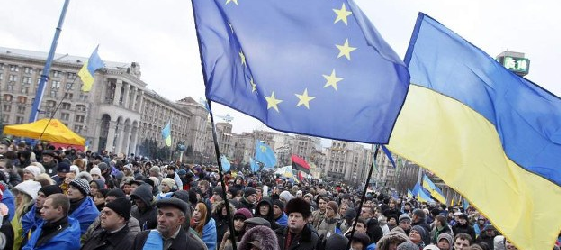For the fourth weekend in a row, Kiev’s Independence Square has become the main scenario for protests against the Ukrainian government’s decision to waive the signing of an association and free trade agreement with the European Union. Around 200,000 protesters have returned to central Kiev in order to remind the government that “Ukraine is Europe”.
Ukraine currently struggles between further integration with the EU or to let itself be seduced by the Russian motherland. According to surveys, almost half of Ukrainians prefer to take a step forward towards European integration rather than remaining under the continuing supervision of Russia. The EU is considered to be synonymous of prosperity, greater transparency and anti-corruption. However, cultural identity and energy dependence from Russia, has made the Ukrainian government to lean closer to neighboring Russia.
The EU has condemned Russia’s tactics seeking to dissuade Ukraine from signing the agreement. Moscow has threatened to restrict trade if Kiev continues approaching its western neighbors. According to The Economist, Viktor Yanukovich and Vladimir Putin would have reached an agreement two weeks ago in Sochi, under which Ukraine would join the customs union led by Russia, comprising Belarus and Kazakhstan, in exchange for 5 billion dollars and a 50 % reduction in the price of gas. Russia and Ukraine have denied, however, the information. Given the contradictory signals by Yanukovich, Brussels has finally decided to suspend negotiations.
Last September, Armenia refused to sign a preliminary agreement of association with the EU, similar to the one that Georgia and Moldova signed in Vilnius last November, in order to join the customs union with Russia.
The power of the EU to demand political reforms in line with EU standards through economic cooperation has been recently questioned. Currently there are five official candidate countries to join the EU: Turkey, Serbia, the former Yugoslav Republic of Macedonia, Iceland and Montenegro. Albania and Bosnia and Herzegovina are potential candidates for membership and Kosovo has recently started negotiations on the Stabilization and Association Agreement, which is the first step to reach adhesion candidate country status.
In early November, the EU resumed negotiations with Turkey after three and a half years of blockade. Turkey is an official candidate for membership in the EU since 2005, the same year that the EU proposed Croatia to begin formal accession negotiations. On 1 July 2013, Croatia became the 28th EU country. Today, it is still uncertain to know when (or rather if) Turkey will (ever) become a member of the EU. Turkish public opinion support towards EU membership has fallen from 73 % in 2004 to 44 % today. Frustrated with the pace of negotiations, Erdoğan has recently flirted with the possibility of joining the Shanghai Cooperation Organization, led by Russia and China.
In mid-2013, the new Icelandic center-right government, contrary to the accession of Iceland to the EU, announced his desire not to go ahead with accession negotiations before the holding a referendum on this matter, date still uncertain. Just a little reminder, Switzerland and Norway voted against joining the EU for different reasons.
At the same time, the EU is also busy dealing with Britain’s threats to leave the Union. British Conservative leader David Cameron has announced that if his party is re-elected in the general elections of 2015 he will hold a referendum on whether or not Britain should stay in the EU.
What happens now in Ukraine reminds us that the EU must remain an exciting project for those countries that have lost the illusion -like UK and Iceland- and remain hopeful for those other countries who have lost hope -as Turkey-.
This article was originally published in the online opinion newspaper 50×7.
Laura BATALLA

























































